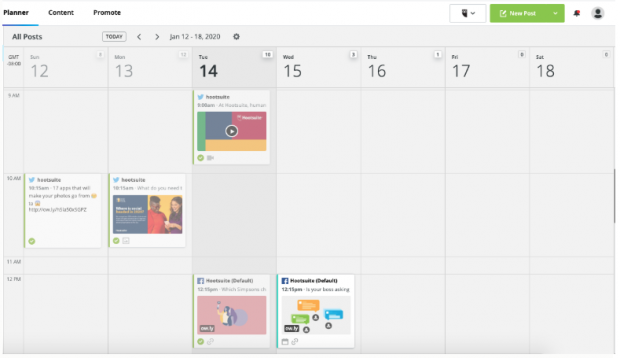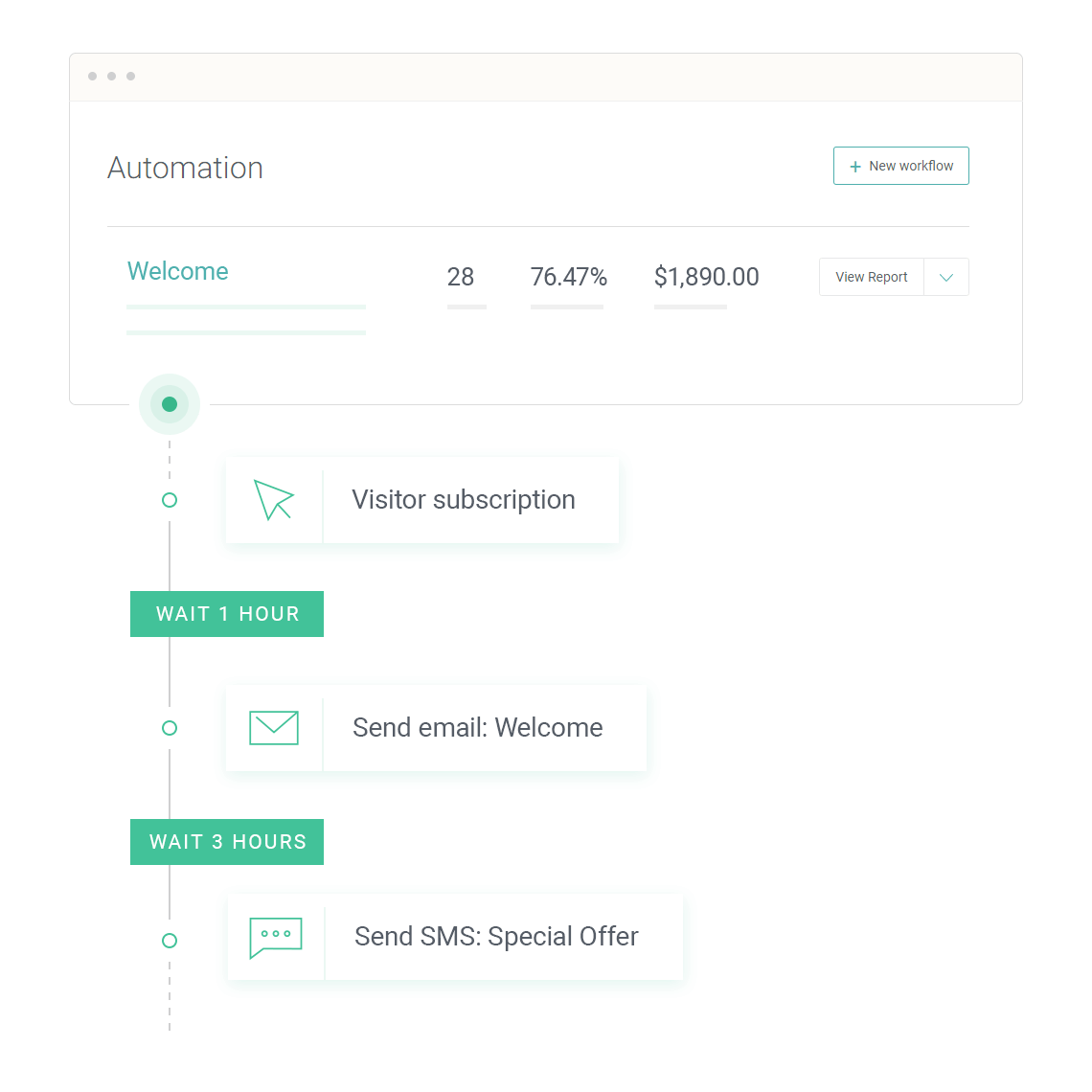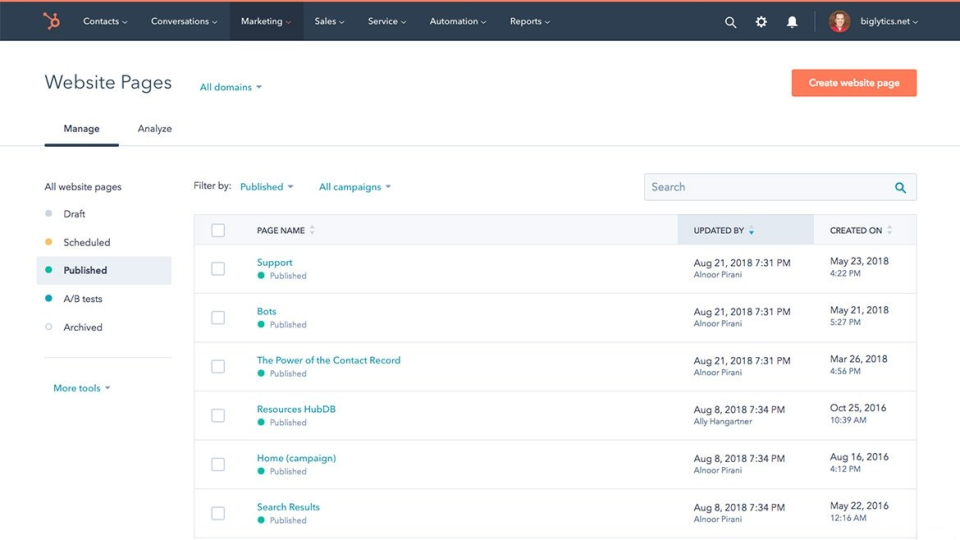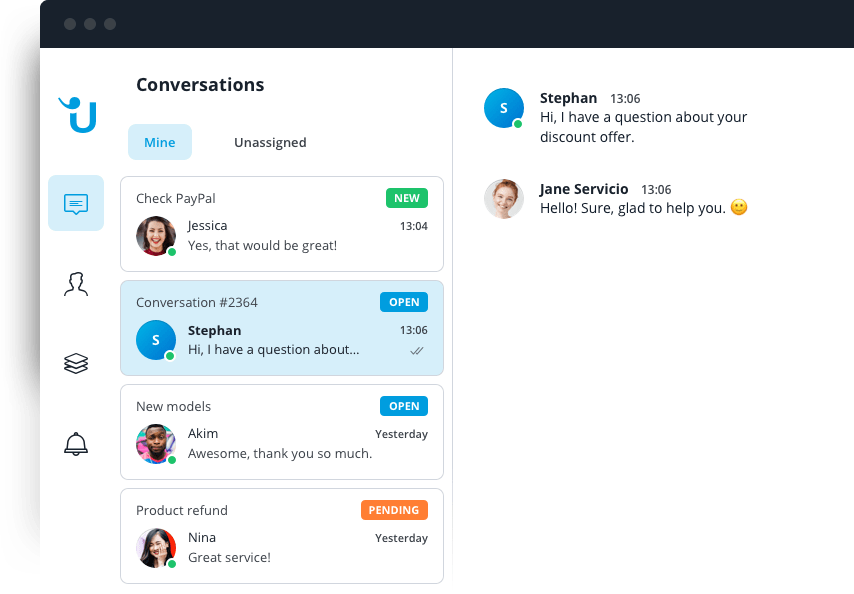Unsure how to shop for marketing software? Here’s a quick breakdown of the tools you need, what to expect from them, and how to select the right ones.

Successful marketing needs more than eye-catching business cards and a “We’re Open!” sign in the front window. In the present digital marketing era, the success of a business’s marketing strategy is directly tied to its marketing tech(nology) stack.
What is a marketing tech stack?
A marketing tech stack (also known as a martech stack) is a collection of software solutions marketers use to plan, launch, track, and fine-tune their marketing campaigns and efforts. Marketing tech stack tools fit with each other in a process flow as opposed to being a messy collection of tools that all do their own things.
Most marketing tech stack tools also integrate with each other in a way that data can flow from one to another as required. This helps streamline marketing processes, encourage communication between stakeholders, and highlight opportunities for innovation and automation.
A strategic marketing tech stack provides a solid foundation for organizing and tracking all your marketing campaigns. The different tools within the stack work in tandem to help your bridge departmental silos and provide a consistent customer experience.
So, how does a small or midsize business (SMB) begin building a marketing tech stack? How do you, as a business owner or marketer, determine which technologies to prioritize over the ones that are better-suited for enterprise-level marketing firms?
To help you, we’ve prepared this article to provide a quick breakdown of the tools you need, what to expect from them, and how to select the right ones.
Assess your business’s marketing processes
Before you jump into marketing buzzwords such as automation, analytics, or engagement it is important to understand how your marketing processes work at the moment. This is integral to identifying the needs that can be met by the tools, the kinds of tools that are going to help, the way they will work with each other, and the role of the human element (yes, tools do not replace the human element!).
Try this exercise with your team:
Get everyone together in a room and chart out your marketing workflow. Whether it is creating an email campaign or a new lead generation strategy, write down each step on a piece of post-it and map them out linearly on a wall or table.
This way you will be able to identify any disconnects or bottlenecks and places where the process slows down. There could also be clusters of notes where the tasks need streamlining.
Each of these clusters, bottlenecks, and slowdowns is a business challenge you need to solve. So look for tools that target those activities, with either complete automation or at least a more streamlined process flow.
Depending on your needs, you can hire a full service digital or digital marketing agency for help with building your marketing stack. Check out our hiring guides for full service digital agencies and digital marketing agencies to determine the best fit for you.
These 3 areas are the core of a strong marketing stack
Content marketing, email marketing, social media management, web analytics, or survey software, there are dozens of tools that fall within the marketing tech category. However, SMBs should refrain from getting distracted by fancy-sounding tools, and instead focus on three core areas: engagement, operations, and insight.
1. Engagement
According to Gartner, software tools under the engagement category are the technologies that power the touchpoints that reach your customers/prospects. They are often channel-specific engines delivering outbound marketing messages and recording outcomes (full article available to Gartner clients).
Two popular types of engagement software that can empower you to build effective, targeted marketing campaigns are email marketing software and social media marketing software.
What is email marketing software?
Email marketing software is a system that automates email communications between a business and its prospects and customers. It offers features such as mass email delivery, contact database, subscribe and unsubscribe, and drag-and-drop email templates.
The software also helps monitor email marketing effectiveness and increase efficiency with actionable insights into the performance of existing and past campaigns.
Email marketing tools help with tasks such as:
Managing email templates
Creating customer-focused newsletters
Sending survey emails
Running promotional campaigns
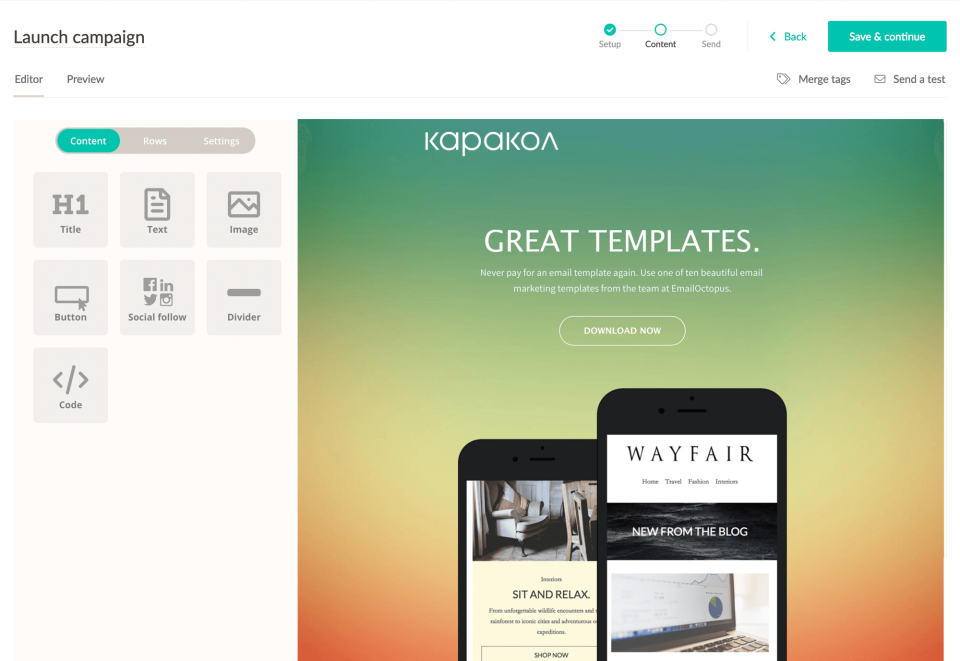
Creating an email campaign in EmailOctopus (Source)
When to consider email marketing software? Your business should consider adding email marketing software to its marketing tech stack if your team is looking for a way to effectively target emails at potential and existing customers, and track the success of the interactions in one centralized hub.
What is social media marketing software?
Social media marketing software is a system that allows marketing teams to build brand recognition and customer loyalty while centralizing all social media activities and outreach in one platform. Typically, the software offers features like automated publishing, content management, and customer targeting.
Social media tools help marketing teams with tasks such as:
Post scheduling and tracking
Conversion tracking
Multi-account management
When to consider social media marketing software? Your business should think about adding social media marketing software to its marketing tech stack if you want to build a social media presence to foster relationships with existing clients.
2. Operations
According to Gartner, tools under the operations category provide a unified repository for your marketing content and help keep your campaigns on track. Operations tools can be a place to house all your assets or they can be tools that help you streamline and automate recurring tasks and processes (full article available to Gartner clients).
Let’s take a look at two of the most common operations software for your marketing tech stack: marketing automation and content management software.
What is marketing automation software?
Marketing automation software helps businesses streamline outbound marketing processes and manage campaigns across multiple channels such as email, social media, and SMS. It also helps automate recurring tasks such as triggering emails or collecting customer data.
Typically, it offers features like ROI tracking, lead management, drip campaigns, lead nurturing, lead segmentation, and channel management.
Marketing automation tools can help your marketing team with tasks such as:
Designing and launching drip campaigns
Lead scoring
A/B testing and analytics
When to consider marketing automation software? You should consider investing in marketing automation software if you’re looking to streamline marketing operations and utilize new marketing technologies to get the most out of each customer interaction.
What is content management software?
Content management software helps businesses manage digital content and assets on their website(s). It helps establish a categorized repository of content and enables the creation, modification, storage, and deletion of all forms of digital assets, including documents, images, and videos.
Content management tools can help with tasks such as:
Customizing content templates
Tracking and indexing assets
SEO management of assets
When to consider content management software? You should consider content management software if you have (or plan to invest in) a large repository of content and marketing assets.
3. Insights
According to Gartner, insights software captures valuable data and delivers insights that can help identify strategies and tactics to meet business goals (full article available to Gartner clients).
It also provides invaluable information on how customers are interacting with your marketing campaigns, giving you the opportunity to fine-tune your moves based on real customer feedback.
What is survey software?
Survey software lets users design, conduct, schedule, and publish electronic surveys, polls, and questionnaires for conducting market research, measuring customer satisfaction, collecting employee feedback, etc. It offers a variety of user feedback formats such as radio buttons, checkboxes, drop-down menus, and free-form text fields.
Survey software can help with tasks such as:
Sentiment analysis
Customer feedback collection
Event follow-up
Survey software resources:
10 Best Free and Open Source Online Survey Software for Your Small Business
7 Great Survey Software Alternatives to SurveyMonkey

Creating a branded survey in SurveyLegend (Source)
When to consider survey software? Your marketing team should consider investing in survey software if you are looking to assess customer feedback on any recent development or marketing activity, or would like to do so regularly.
What is customer experience software?
Customer experience software allows your teams to manage interactions with existing and potential customers and track aspects such as sentiment and interactions. It helps marketers monitor, respond to, and improve every key moment along the customer journey while incorporating real-time customer feedback into their decision-making processes.
Customer experience software can help with tasks such as:
Multichannel data collection
Data collection to build better targeting strategies
Predictive analytics
Customer experience software resources:
Free and Open Source Customer Experience Software: 6 Awesome Options
A Year in CX: What Your Business Can Learn From Our Customer Experience Survey
When to consider customer experience software: Your business should consider customer experience software if you are looking to actively monitor how your customers are engaging with your website, emails, marketing activity, and other digital fronts.
How could all these tools work with each other?
It is important to understand that marketing tools that work in silos will not be beneficial to your business. Data and assets will need to flow from one tool to another, in different forms.
For instance, the insights gathered via email marketing software will need to flow into a marketing automation tool for better lead segmentation and qualification. Likewise, assets stored in the content management software could need to flow into social media marketing, survey, email marketing, and customer experience tools.
Therefore, for a marketing tech stack to be successful, you need to ensure that the tools you choose are capable of talking to each other. This goes beyond direct integration and requires a thorough understanding of how and where each tool fits in the marketing workflow.
So, try to chart out how you think this will work for your business — create a flow chart of how the tasks and data will flow from one tool to another.
Here, we’ve provided an example of how such a workflow chart could look like. This shows how various marketing tools could work together, forming a network of marketing processes and activities.
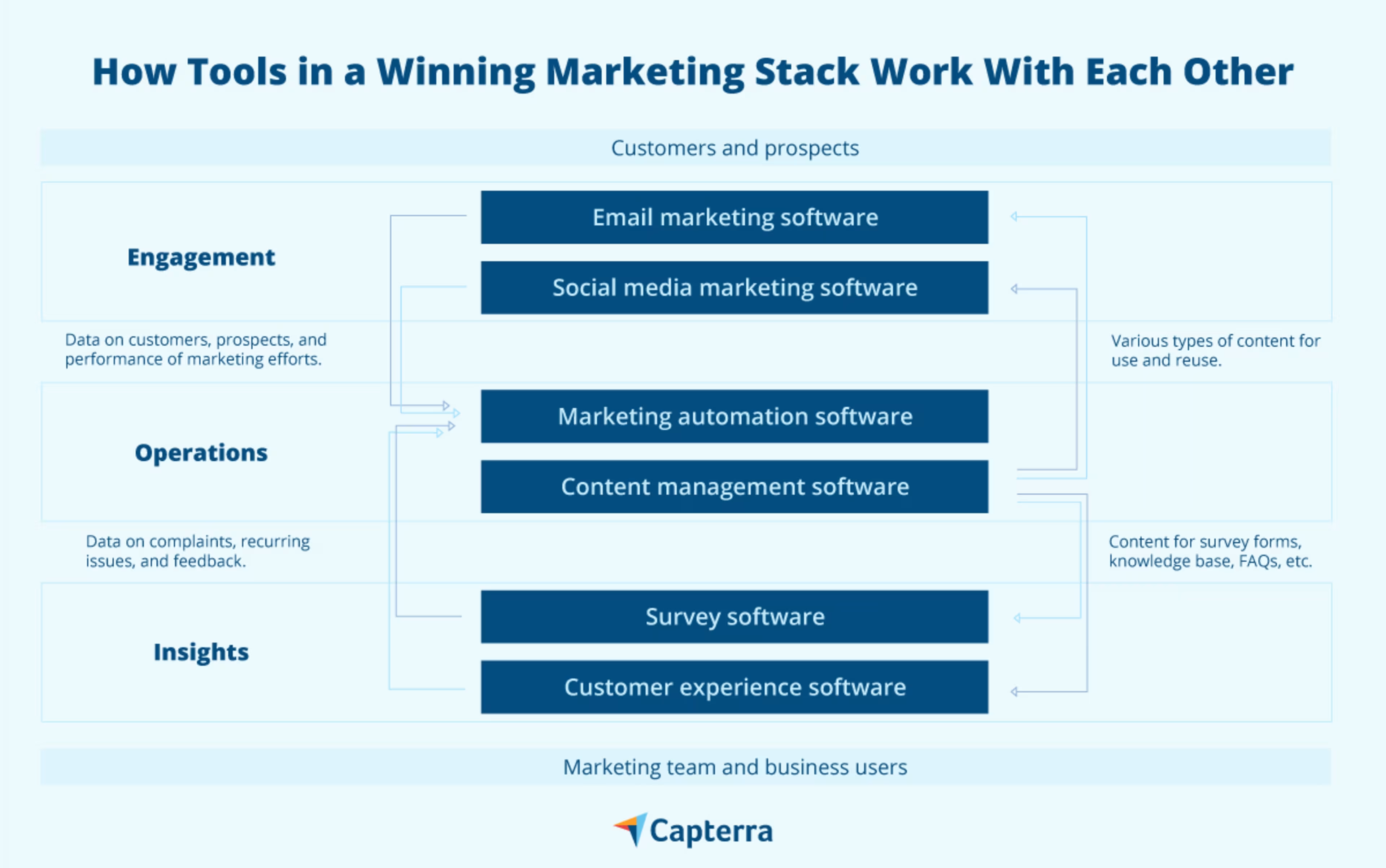
What to keep in mind when exploring marketing tech tools
With all these different tools to explore for your marketing stack, it can be overwhelming to figure out how to proceed or evaluate tools. To help you out, we’ve listed some questions to ask when evaluating tools for a marketing tech stack.
How far has the technology developed?: Just like any other field, technological developments see different adoptions in marketing every day. Blockchain for advertising, over-the-top TV advertising, and visual search for marketing are just a few examples of technologies that have seen growing interest and adoption in 2019.However, as a small or midsize business, you have limited resources to invest. So focus on the technologies that are already mainstream or extremely promising and add immediately quantifiable value to your business.
How critical are integrations? Integrations help your tools talk to each other, and hence are very important to your marketing stack. Most tools offer built-in integrations (i.e., a direct connection between two or more applications) or integrations via third-party tools such as Zapier, IFTTT, and Automate.io.
If the tools you’re considering do not directly integrate, at the least, make sure the data from one can flow into the other. For instance, ensure that the survey tool allows you to download data as Excel or CSV files so that you can feed it into your marketing automation tool. However, this should only be your last option; integration is always preferable over manually moving data from one tool to another.
Do I need software specific to my industry? The short answer is “probably not.” Most marketing tools are functionality-specific and not industry-specific. So regardless of the industry you come from, if you need a tool to monitor your social media, a standard social media management tool should work fine.However, if you are also evaluating project management tools, accounting tools, or business intelligence tools as an add-on to your marketing stack, you can explore industry-specific solutions for those.
What do my peers think? Looking at reviews from actual users could not only save time in the research but also keep you from repeating mistakes others have already made. So spend some time reading reviews on third-party platforms like ours.
If you want, take it a step further and get in touch with some current users of your preferred software. You could explore the vendor’s website for success stories and get in touch with some of the businesses they have highlighted. Just remember to pick businesses similar to yours in industry, size, customer base, and geography.Here is more on how you should go about this and what to ask.
Will my business outgrow this software? Eventually, yes. But you still want to plan for the long term and account for the coming months and years. To do that, utilize the knowledge and subject matter expertise within your team and let them contribute to evaluating the marketing tool.Look for the kind of thought leadership the vendor is offering via their blogs, articles, webinars, and social media. Also, evaluate how often they tweak their tool to incorporate new things.
And finally, test drive the tools for a few weeks before signing up for a year-long contract. This will help you figure out what value could the tool offer and what challenges to expect from it.
